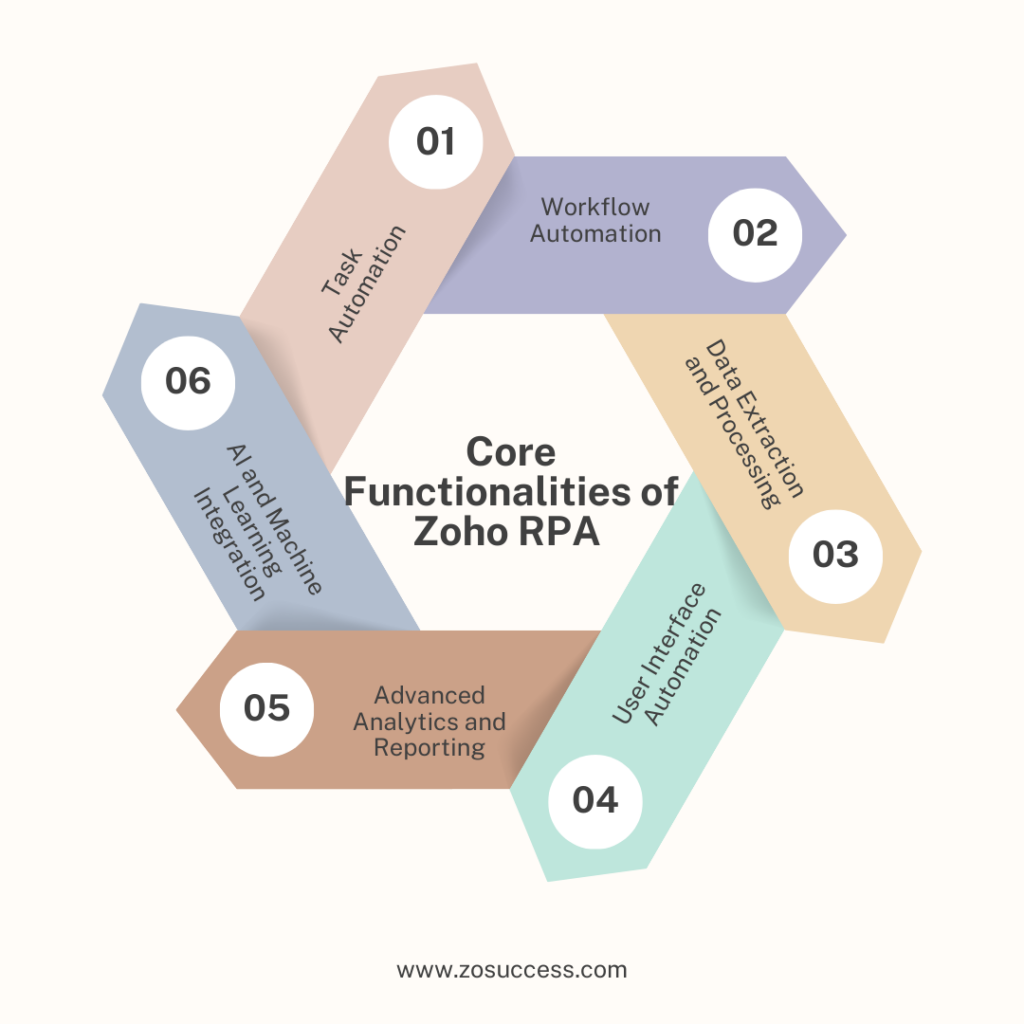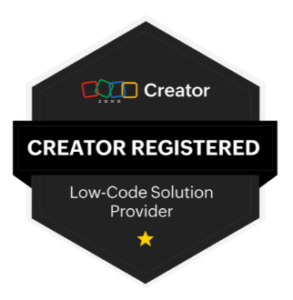Brief Overview of Zoho RPA
Zoho RPA (Robotic Process Automation) is a cutting-edge automation tool designed by Zoho to help businesses streamline and automate repetitive, rule-based tasks. As part of Zoho’s comprehensive suite of productivity and business applications, Zoho RPA allows companies to minimize manual intervention by deploying bots to execute tasks that traditionally require human effort. Whether it’s processing forms, handling customer queries, or managing data, Zoho RPA automates these tasks to save businesses time, reduce errors, and improve operational efficiency.

Why Automation Matters in Today’s Business Landscape
In the modern business world, automation has become a critical component of success. The need to improve business processes, reduce costs, and enhance productivity has driven companies to adopt automation tools. With the growing complexity of business operations and the need for real-time decision-making, automating repetitive tasks not only saves valuable time but also reduces human error. Tasks such as data entry, file management, and even customer service queries can be automated, freeing up employees to focus on more strategic work. In fact, automation allows businesses to stay competitive by optimizing resource allocation and making operations more efficient.
Zoho RPA plays a crucial role in this automation revolution, helping businesses stay ahead in a competitive environment.
Purpose of the Post
In this post, we will dive into the core functionalities of Zoho RPA, its benefits, and how it can transform your business operations. We will explore the ways Zoho RPA can automate repetitive tasks, streamline workflows, and enhance productivity across various departments within your organization. The goal is to help businesses understand how adopting Zoho RPA can lead to improved efficiency, cost savings, and better decision-making. By the end of this post, you’ll have a clear understanding of how Zoho RPA can be an invaluable tool in optimizing your business processes.
What is Zoho RPA?
Introduction to Zoho RPA
Zoho RPA is a software tool that uses IT robotics to automate repetitive tasks within a business process. It enables organizations to design workflows where bots perform specific tasks with precision and speed, just as a human would. These bots can be programmed to interact with software, handle data, and execute a range of operations across different applications. Zoho RPA is built to integrate seamlessly with the Zoho ecosystem and third-party tools, making it a versatile solution for businesses of all sizes.
In simpler terms, Zoho RPA acts as a virtual workforce that takes over mundane tasks, allowing human employees to focus on high-value work that drives innovation and business growth.
Components of Zoho RPA
- Bots: At the heart of Zoho RPA are its bots, which perform tasks exactly as a human would, only faster and with no errors. Bots can be programmed to handle tasks such as data extraction, file transfers, and email responses.
- Workflows: Workflows define the sequence of tasks that a bot will follow to complete a process. For example, in an HR department, the workflow might include tasks like verifying employee information, entering it into the database, and then sending a confirmation email.
- Scheduler: The scheduler is another important component of Zoho RPA. It automates task execution at scheduled times, ensuring that operations run even when employees are unavailable. For example, it can automatically generate daily reports or run backups at night.
Integration with the Zoho Ecosystem
One of the key features of Zoho RPA is its seamless integration with other Zoho products. It can easily integrate with Zoho CRM, Zoho Desk, Zoho Books, and other applications, making it possible to create fully automated business workflows that span multiple departments. Beyond Zoho applications, Zoho RPA can also integrate with third-party systems and applications, giving businesses the flexibility to automate their entire ecosystem.
By connecting Zoho RPA with other business systems, organizations can automate end-to-end processes across various departments, creating a streamlined and unified experience that reduces manual work and enhances collaboration.
Core Functionalities of Zoho RPA
1. Task Automation

One of the most straightforward yet powerful functionalities of Zoho RPA is its ability to automate repetitive tasks. Common tasks such as data entry, processing forms, and handling customer queries can be automated, saving employees hours of time each day. Automation not only increases speed but also ensures accuracy, as bots follow predefined rules and eliminate the possibility of human error.
For example, a bot could automatically update customer contact information in a CRM, freeing up the sales team to focus on building relationships rather than updating databases manually.
2. Workflow Automation
Zoho RPA goes beyond individual task automation by allowing the automation of entire workflows. For instance, consider an employee onboarding process that involves multiple departments. With Zoho RPA, businesses can automate each step, from verifying new employee details to creating email accounts and assigning IT equipment. This results in faster, more efficient onboarding with fewer opportunities for errors or delays.
3. Data Extraction and Processing
In today’s data-driven world, companies depend on accurate and timely data. Zoho RPA’s data extraction and processing capabilities allow it to gather data from multiple sources, such as websites, emails, and databases, and convert it into usable information. This can include extracting customer details from email inquiries, processing sales data, or scraping data from web pages.
Once the data is extracted, Zoho RPA can process it by organizing it into databases or generating reports for analysis. This reduces the need for manual data entry and increases the operational efficiency of the organizations.
4. User Interface Automation
For businesses that use software applications without APIs or those that require complex user interface (UI) interactions, Zoho RPA offers UI automation capabilities. Bots can simulate human actions such as clicking buttons, entering data into fields, or navigating through web pages, even when there is no available API.
This functionality is especially useful for automating legacy applications or third-party software that may not support integration with other tools.
5. Advanced Analytics and Reporting
Zoho RPA offers advanced analytics capabilities that provide insights into automated tasks and workflows. By tracking the performance of bots, businesses can identify areas for improvement and optimize workflows accordingly. Analytics dashboards display key metrics, including task completion times, success rates, and productivity improvements, allowing managers to make informed decisions.
6. AI and Machine Learning Integration
Zoho RPA can also integrate with artificial intelligence (AI) and machine learning (ML) models, further enhancing its automation capabilities. With AI and ML, Zoho RPA can analyze large amounts of data to identify patterns, make predictions, and improve decision-making. For instance, it can be used to predict customer behavior or optimize supply chain processes based on past data.
Benefits of Zoho RPA for Businesses
1. Increased Efficiency
Automating tasks with Zoho RPA dramatically increases operational efficiency. Tasks that used to take hours can now be completed in minutes, allowing businesses to operate faster and handle more work. For example, automating data entry or report generation reduces the time spent on manual tasks and improves turnaround times.
2. Cost Savings
By eliminating the need for manual labor in repetitive tasks, Zoho RPA helps reduce operational costs. Instead of hiring additional employees to handle routine tasks, businesses can rely on bots to perform these duties, significantly reducing labor costs. Additionally, by eliminating errors, Zoho RPA helps save on costs that would otherwise arise from correcting mistakes.
3. Improved Accuracy
Bots in Zoho RPA can follow predefined workflows and rules, ensuring that tasks are completed consistently and without error. Unlike humans, bots do not get tired, distracted, or make mistakes, leading to more accurate results. Whether it’s entering customer information into a database or processing financial reports, Zoho RPA guarantees precise and reliable outcomes.
4. Scalability
Zoho RPA is designed to grow with your business. As your operations scale and your tasks become more complex, Zoho RPA can handle an increased volume of work. New workflows can be added with ease, and more bots can be deployed to accommodate higher task volumes without requiring additional human resources.
5. Better Employee Experience
With Zoho RPA handling repetitive and mundane tasks, employees can focus on more strategic work that adds value to the business. This leads to improved employee satisfaction and productivity, as employees are no longer bogged down by tedious tasks like data entry or manual processing.
6. Enhanced Customer Experience
Automation improves response times and reduces errors, leading to better customer service. Zoho RPA can be used to automatically process orders, respond to customer inquiries, and manage requests more efficiently. This results in faster, more reliable service and ultimately a better customer experience.
How Zoho RPA Transforms Business Operations
1. Streamlining Business Processes
From finance to HR and customer service, Zoho RPA transforms business processes by automating complex workflows. For example in HR, it can automate employee onboarding, payroll management, and performance tracking. In customer service, it can automate ticket management, ensuring that requests are addressed promptly and efficiently.
2. Reducing Operational Bottlenecks
Zoho RPA helps identify and eliminate operational bottlenecks that can slow down business processes. By automating approvals, task assignments, and communications, businesses can ensure smoother transitions from one process to another, reducing delays and improving overall workflow efficiency.
3. Improving Compliance and Security
Zoho RPA ensures tasks are performed in accordance with company policies and industry regulations. Automation reduces the chances of errors that could lead to compliance issues or security breaches. Additionally, bots can securely handle sensitive data, adhering to privacy regulations.
4. Optimizing Resource Allocation
With routine tasks automated, businesses can allocate resources more effectively. Employees are freed from manual tasks and can focus on high-value activities like strategic planning, product development, or customer relationship management.
Conclusion
Zoho RPA is revolutionizing how businesses operate by automating routine tasks, reducing costs, improving accuracy, and enhancing overall efficiency. By leveraging the power of automation, organizations can stay competitive in today’s fast-changing business environment. From streamlining workflows to enhancing customer experiences, Zoho RPA provides an all-encompassing solution to optimize business operations across all departments.
The future of business automation lies in tools like Zoho RPA, which empowers companies to achieve greater productivity and scalability while ensuring more accurate, faster, and efficient processes. If you’re looking to streamline your operations and improve business performance, Zoho RPA could be the key to unlocking your company’s full potential.
Ready to transform your business operations with the power of automation? Zoho RPA can help you streamline your workflows, reduce costs, and improve efficiency. Don’t wait for the future; bring automation to your business today.
Contact our team of Zoho RPA Consultants to learn more about how Zoho RPA can revolutionize your processes or request a demo to see it in action. Our team of experts is here to guide you through every step of your automation journey.


 “ZOSuccess” is the Zoho Consulting Practice of Dhruvsoft Services Private Limited – a leading Zoho Advanced Partner from India – providing services worldwide …
“ZOSuccess” is the Zoho Consulting Practice of Dhruvsoft Services Private Limited – a leading Zoho Advanced Partner from India – providing services worldwide …